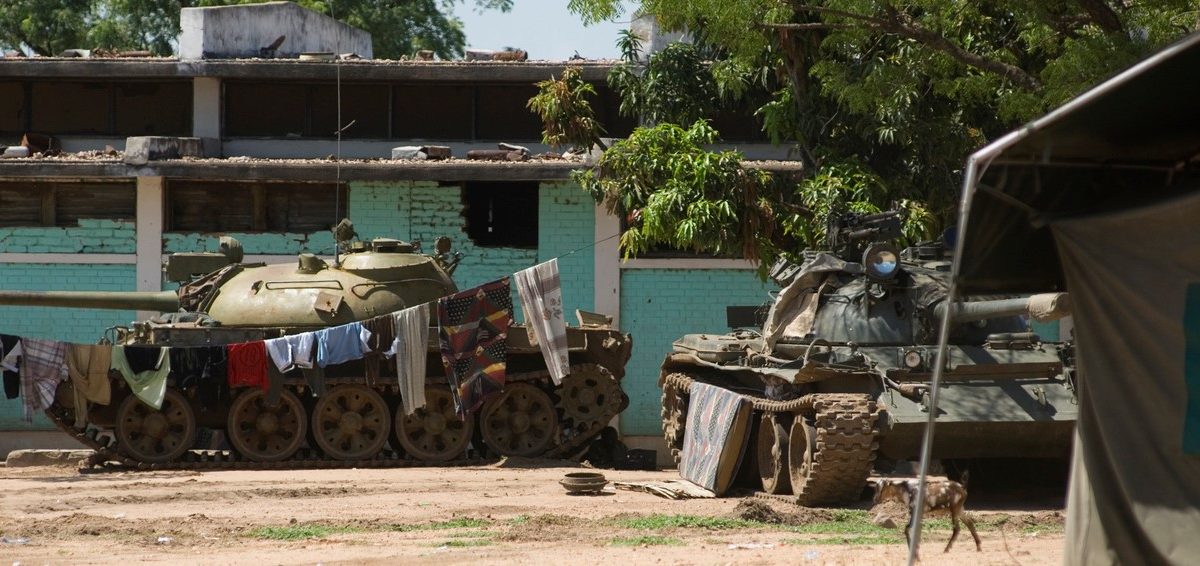
Will the Tanks Stop Rolling in Darfur?
Whilst the events of the last twelve months in Sudan have serious implications for the political order in Khartoum, the fall of the Omar al-Bashir regime has also provided an unexpected opportunity to end the conflicts between the state and rebels in Darfur and other regions. Both sides are keen to seize the moment provided by the change in political circumstances, potentially bringing an end to decades of conflict. Nevertheless, although Prime Minister Abdalla Hamdok and his civilian cabinet may be genuine in wanting to unify the country, there remains an inescapable reality that any peace deal will be imperfect and unlikely to satisfy fully the demands of Darfuris.
In April 2019, following months of protests against his rule, al-Bashir was toppled in a military coup, ending some two decades in power. In the wake of this, a political battle ensued between the Transitional Military Council (TMC) and an alliance of different civil society groups – Forces for Freedom and Change – over the transition towards civilian rule. Following the dreadful June 2019 massacre in Khartoum, Sudan’s new dawn was pulled from the brink of collapse, as a power-sharing transitional agreement was reached in August 2019. A month later, a civilian cabinet, led by Hamdok, was sworn in and, although the nation’s fate is far from certain and the military still has significant influence, there exists a cautious optimism that the civilians in government have the upper hand. And at the top of their list of priorities is peace with Sudan’s rebel groups.
In November, Hamdok made a visit to al-Fashir, the capital of North Darfur state, and announced that his government was working towards achieving peace in the region; however, a key demand of local activists is accountability for those involved in past atrocities. This puts Hamdok in a delicate position, given that his administration’s continued existence relies on support from his military partners, one of whom is General Mohamed Hamdan Dagalo (“Hemedti”). In light of the fact that Hemedti is the commander of the Rapid Support Forces (RSF) paramilitaries (formerly known as the Janjaweed), which has been accused of being the chief culprit of crimes against humanity in Darfur, it will be almost impossible for the civilians in government to sell this demand to the generals in Khartoum.
Other obstacles exist too. Locals in Darfur are also demanding the expulsion of settlers from their lands, as well as the disarmament of the RSF, both of which will face fierce opposition in Khartoum. Then there is the question of al-Bashir and judicial proceedings against him for his role in Sudan’s ethnic violence. While the Forces for Freedom and Change has declared that it has no problem handing him over to the International Criminal Court (ICC), such a move could spook older military figures, whose continued co-operation is required to ensure Sudan’s successful transition to civilian rule.
That said, despite these challenges, there are grounds for cautious optimism. In January, Hamdok addressed a large crowd in the rebel stronghold of Kauda, inviting the region’s population to embrace the peace process and extending an invitation to rebel leader Abdel-Aziz al-Hilu to visit Khartoum. The regime in the capital, for its part, has also moved to accommodate civilian demands, with Attorney General Tag el-Sir el-Hibir announcing that Sudan will investigate crimes against humanity committed in Darfur from 2003 onwards. Crucially, this includes a criminal case against al-Bashir, former defence minister Abdel-Rahim Mohamed Hussein, and 51 other former regime officials, as well as legal proceedings to force the return of former intelligence chief Salah Abdallah (“Gosh”) from Egypt to face a trial in Sudan.
The negotiations have also made steady progress in the past few months. In late December, the government and the Sudan Revolutionary Front (“SRF”), a coalition of nine rebel groups, signed an agreement on a roadmap towards ending the Darfur conflict. There are also efforts being made to negotiate with groups in the Blue Nile and South Kordofan regions. Mediators are hopeful of reaching a final deal by February, with both sides emphasising the need to devolve powers and address the needs of people in rural areas. Perhaps tellingly, the government’s delegation in the talks is headed by a member of the military Sovereign Council, General Shams al-Din Kabbashi, with Hemedti also making this presence known during separate talks in Juba.
Whilst there can be little doubt regarding the sincerity of Hamdok and the civilians in government in negotiating with the rebels, the issue of accountability for past crimes will be a thorn in the side of those trying to broker an agreement. This will continue to be the case as long as former regime figures such as Hemedti continue to hold sway in the new Sudan. It remains likely that a deal will be reached, with no appetite from either side to return to war, but whether the terms of any such agreement will be satisfactory to the communities most affected by this conflict is a question that cannot go ignored. If the local community are unsatisfied with the deal, the potential for a return to conflict will remain high.
This article originally featured in Africa Integrity’s January 2020 Newsletter. To join our newsletter mailing list, please contact us.